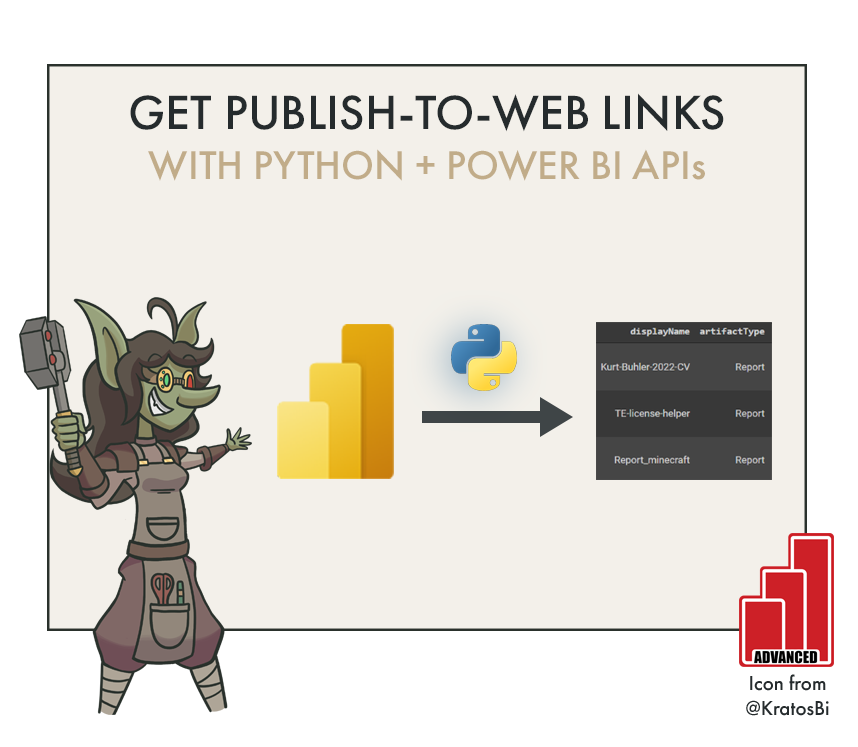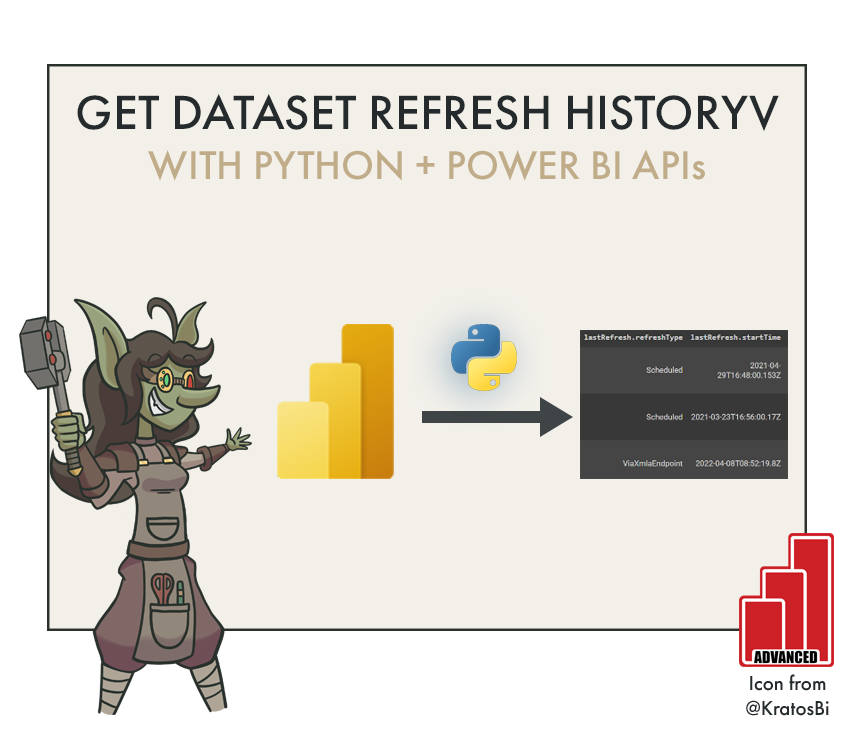Get Publish-to-Web & Org. share links from Power BI API with Python
USE PYTHON TO GET DATA FROM POWER BI APIs
…such as the publish-to-web links created in your organization
IN THIS ARTICLE
Get Publish-to-Web share links from Power BI Admin API using Python
Get links shared to the entire organization (i.e. for Reports, Dashboards)
Example result dataframe for publish-to-web reports obtained with Power BI APIs
HOW TO SET IT UP?
I wrote a post about setting up a Service Principal, permissions & settings to get you started, as well as explaining the Authentication. You can find that post, here.
#########################################################################################
# Authentication - Replace string variables with your relevant values
#########################################################################################
import json, requests, pandas as pd
try:
from azure.identity import ClientSecretCredential
except Exception:
!pip install azure.identity
from azure.identity import ClientSecretCredential
# --------------------------------------------------------------------------------------#
# String variables: Replace with your own
tenant = 'Your-Tenant-ID'
client = 'Your-App-Client-ID'
client_secret = 'Your-Client-Secret-Value' # See Note 2: Better to use key vault
api = 'https://analysis.windows.net/powerbi/api/.default'
# --------------------------------------------------------------------------------------#
# Generates the access token for the Service Principal
auth = ClientSecretCredential(authority = 'https://login.microsoftonline.com/',
tenant_id = tenant,
client_id = client,
client_secret = client_secret)
access_token = auth.get_token(api)
access_token = access_token.token
print('
Successfully authenticated.')
#########################################################################################
# Note 1: This code was authored for use in a Google Colab Notebook
# Note 2: Check here for info on using Azure Key Vault:
# https://docs.microsoft.com/en-us/azure/key-vault/secrets/quick-create-python
# The above code should be modified to programmatically get the secret from AKV
#########################################################################################
# Admin: Get all Publish-to-Web links
#########################################################################################
base_url = 'https://api.powerbi.com/v1.0/myorg/'
header = {'Authorization': f'Bearer {access_token}'}
# The admin API doesn't work unless you provide a ?$top=n argument
# Top 5000 workspaces
# Admin: Get all Publish to Web artifacts
# Query for the admin scenario (everything)
# The admin API doesn't work unless you provide a ?$top=n argument
topn = '$top=5000'
admin_pubtoweb = f'{base_url}admin/widelySharedArtifacts/publishedToWeb?{topn}'
# HTTP GET Request
published_to_web = requests.get(admin_pubtoweb, headers=header)
# Response code (200 = Success; 401 = Unauthorized; 404 = Bad Request)
print(published_to_web)
try:
published_to_web = json.loads(published_to_web.content)
except Exception as e:
print(e)
exit()
try:
pd.concat([pd.json_normalize(x) for x in published_to_web['ArtifactAccessEntities']])
except Exception:
print('No publish-to-web links found.')
#########################################################################################
# Authentication - Replace string variables with your relevant values
#########################################################################################
import json, requests, pandas as pd
try:
from azure.identity import ClientSecretCredential
except Exception:
!pip install azure.identity
from azure.identity import ClientSecretCredential
# --------------------------------------------------------------------------------------#
# String variables: Replace with your own
tenant = 'Your-Tenant-ID'
client = 'Your-App-Client-ID'
client_secret = 'Your-Client-Secret-Value' # See Note 2: Better to use key vault
api = 'https://analysis.windows.net/powerbi/api/.default'
# --------------------------------------------------------------------------------------#
# Generates the access token for the Service Principal
auth = ClientSecretCredential(authority = 'https://login.microsoftonline.com/',
tenant_id = tenant,
client_id = client,
client_secret = client_secret)
access_token = auth.get_token(api)
access_token = access_token.token
print('
Successfully authenticated.')
#########################################################################################
# Note 1: This code was authored for use in a Google Colab Notebook
# Note 2: Check here for info on using Azure Key Vault:
# https://docs.microsoft.com/en-us/azure/key-vault/secrets/quick-create-python
# The above code should be modified to programmatically get the secret from AKV
#########################################################################################
# Admin: Get all links shared to the entire org.
#########################################################################################
base_url = 'https://api.powerbi.com/v1.0/myorg/'
header = {'Authorization': f'Bearer {access_token}'}
# The admin API doesn't work unless you provide a ?$top=n argument
# Top 5000 workspaces
# Admin: Get all Publish to Web artifacts
# Query for the admin scenario (everything)
# The admin API doesn't work unless you provide a ?$top=n argument
topn = '$top=5000'
admin_links = f'{base_url}admin/widelySharedArtifacts/linksSharedToWholeOrganization?{topn}'
# HTTP GET Request
whole_org_links = requests.get(admin_links, headers=header)
# Response code (200 = Success; 401 = Unauthorized; 404 = Bad Request)
print(whole_org_links)
try:
whole_org_links = json.loads(whole_org_links.content)
except Exception as e:
print(e)
exit()
try:
pd.concat([pd.json_normalize(x) for x in whole_org_links['ArtifactAccessEntities']])
except Exception:
print('No links found.')
Code is provided as-is with no guarantees or warranties of any kind. Something I did quickly in spare time.





